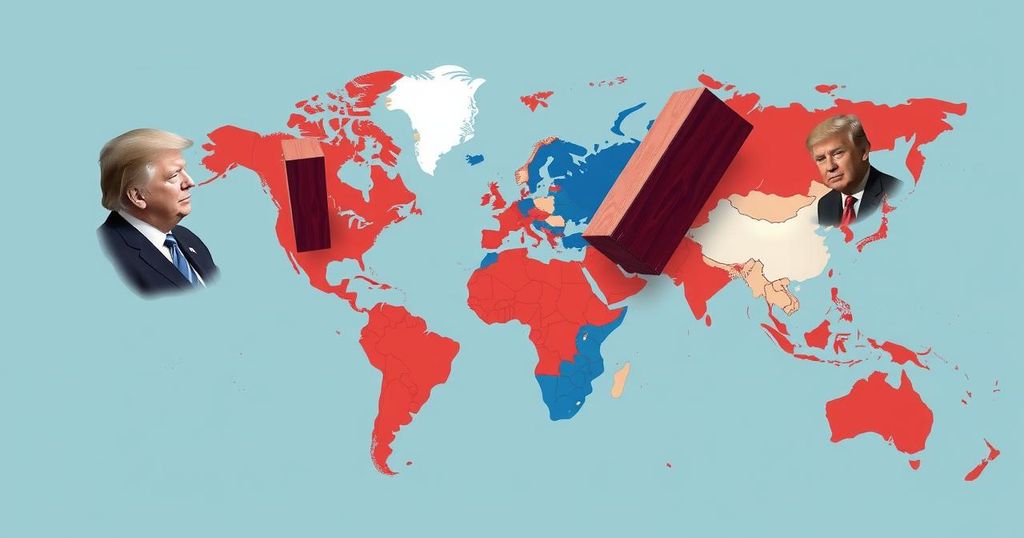The article explores the global anti-incumbent wave in 2024, where numerous leaders faced electoral defeats or removal, driven by public frustration and social media influence. Significant political changes occurred in countries like Senegal, South Africa, and the UK, emphasizing the need for governments to prioritize citizen engagement and economic growth to rebuild trust in democratic institutions.
In 2024, there was a remarkable global trend against political incumbents as leaders across various nations were either ousted through elections or faced forcible removal from office. Highlighting a pivotal message by Mohammad Al Gergawi, the UAE cabinet minister, governments must evolve from merely managing crises to creating ambitious futures that instill hope in their citizens. The year witnessed examples such as Senegalese President Macky Sall’s defeat in March, the African National Congress losing its majority in South Africa in June, and Indian Prime Minister Narendra Modi’s party facing significant parliamentary losses within the same timeframe.
As the year progressed, further instances of the anti-incumbent wave emerged, including the Labour Party’s victory in July over the Conservative government in the UK and the loss of the ruling Liberal Democratic Party’s majority in Japan by October. The political landscape in Germany shifted as Chancellor Olaf Scholz lost a vote of confidence that heralds an early election. In Canada, Prime Minister Justin Trudeau’s dismissal of his finance minister introduced fresh political turbulence.
Moreover, some leaders were removed through popular uprisings, notably in Bangladesh and Syria, where existing governments faced fierce protests leading to their leaders’ flight. One may wonder what underlies this wave of political change. An investigation suggests social media’s role in transforming the political landscape, leading to diminished trust in government and increased polarization.
Research indicates that social media often results in echo chambers, exacerbating partisan divisions, particularly evident in the U.S. Nevertheless, while social media may amplify extremist perspectives, its effectiveness in securing power for incumbents remains questionable. Countries such as Spain and Greece have witnessed incumbents retain their positions despite a general trend of anti-incumbency.
It is imperative that leaders engage with constituents through social media channels and address their concerns directly, as evidenced by the negative perceptions captured from citizens of Grimsby, UK. They expressed views of their government as ‘irrelevant’, ‘distant’, and ‘untrustworthy’. Restoring public confidence demands a renewed focus on economic empowerment and growth. Evidence suggests that political fortunes correlate strongly with economic conditions, as seen in Spain’s and Greece’s re-elections in contrast to French voters who opted for change amidst stagnation.
To navigate these complexities, political leaders must envision not just immediate budgetary reforms but also long-term benefits that uplift their citizens’ lives. Successful past initiatives, like the New Deal or the UK’s welfare system, demonstrate the potential of bold policies expressed even in difficult times. Encouragingly, visionary individuals across the public and private sectors can contribute innovative solutions to address societal frustrations.
Ultimately, a politics guided by hope rather than crisis can restore faith in democratic governance. Citizens desire a political framework that is ‘realistic’, ‘meaningful’, and ‘hopeful’. Meeting these aspirations will cultivate trust and commitment from the populace towards their governments.
The piece examines the context of a significant anti-incumbent sentiment that has surfaced globally in 2024, characterized by elections and political unrest leading to the removal of long-standing leaders. The discussion touches on the role of social media in shaping political discourse, exacerbating divisions, and influencing public perceptions of governments, thereby creating an environment conducive to change. Additionally, it emphasizes the importance of economic performance and citizen engagement in restoring political trust and empowering future governance strategies.
In summary, the global wave against incumbents in 2024 highlights a significant shift in political dynamics driven by citizens’ desire for hope and meaningful governance. The role of social media in fostering polarization and the correlation between economic conditions and political stability have become evident. Political leaders are urged to engage with public concerns and promote ambitious, future-oriented policies to rebuild trust and assure empowerment. Ultimately, a renewed focus on hope and citizen interaction is essential for the resilience of democracies worldwide.
Original Source: www.aspistrategist.org.au






